Peace message: Gareth Bale joins children of Wales for centenary year
At dawn on 28 June 1922, a signal on behalf of the children of Wales was sent from an Oxfordshire radio station.
It was the first peace and goodwill message, and was heard and repeated at the Eiffel Tower in Paris.
A similar message has been shared every year since, reaching 84 million people in 2021, and this unique gesture has now chalked up its centenary.
It'll be translated into 100 languages this year as footballers Gareth Bale and Aaron Ramsey lend their support.
Others who have helped spread the message in the past include Hollywood actress Catherine Zeta-Jones, who is from Swansea, and former US first lady Hillary Clinton, who has Welsh roots.
The message is shared by Urdd Gobaith Cymru - Wales' biggest youth movement - with this year's focusing on the climate emergency, carrying the message: "It's time to wake up."
Last year's was on the topic of gender equality.
Bale and Ramsey are two of the four million former members of the Urdd, with more than 55,000 youngsters aged eight to 25 currently enrolled, enjoying activities through the medium of Welsh.
The Urdd was formed in January 1922, and the 100th message will be shared from the Nobel Peace Centre in the Norway capital of Oslo.
First Minister Mark Drakeford described it as "the ideal location", adding: "At a time when the peace of the world is in such peril, the message, and work of the Urdd in welcoming refugees to Wales have never been more significant.
"The theme of the climate emergency, too, will resonate with young people from around the globe as we work together to protect the fragile planet which we inhabit together."
'It's important to understand international affairs'
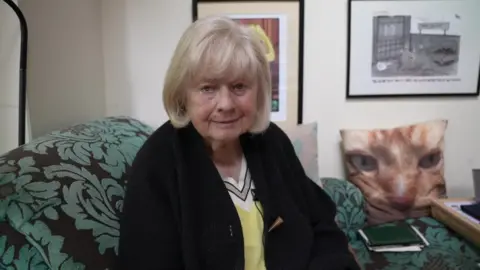
"I'm glad that the peace messages have continued for so long," said former Labour MP Ann Clwyd. She was 14 when she took part in the message in 1952 at Chester Cathedral and called it "a "great honour".
She believes young people should focus not only on the issues or worries that affect their own country.
"I think it's important for young people to understand international affairs, to know what's going on in other countries," said the former Cynon Valley MP.
From Morse code to telegrams, songs to online poems, the annual message has been delivered in many forms.
Now it will appear in a multitude of languages, and will be shared online across the world.
Throughout the past 100 years, the message has reflected periods of great change - from the atomic bomb to refugees, poverty to knife crime.
The first message was sent by the Reverend Gwilym Davies. He was from the Rhymney Valley in south Wales, and a pacifist who played a prominent role in the formation of Unesco (United Nations Educational, Scientific and Cultural Organization).
He believed in uniting the children of the world.
The annual message of peace and goodwill is now delivered on 18 May every year, and has been arranged by the the Urdd since the 1950s.
Over the years, generations of young people in Wales have been involved in reaching out to people across the world.
'It's accessible, wherever you are'
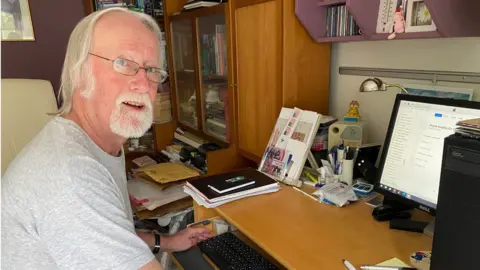
In 1978, Geraint Davies was a member of Welsh language band Hergest while he worked for the Urdd, and that year, the message was recorded as a song.
He co-wrote it with fellow band member Delwyn Sion, who sang it, and it was recorded in six languages.
"It was an honour to be asked to take part, because it was something that reached a lot of people," Mr Davies recalled.
"The whole point of the goodwill message to mankind is that it's accessible, wherever you are."
'Diplomacy is the way forward'
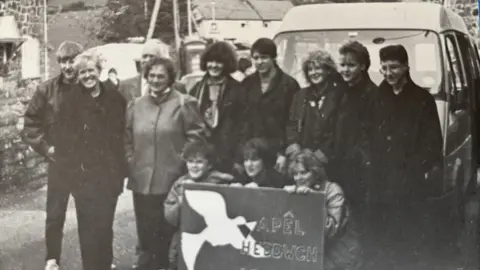 Guto Puw
Guto PuwAs the Cold War continued, nuclear disarmament was the theme of the 1986/1987 message.
Guto Puw was among 18 young people who took 20,000 telegrams calling for an end to nuclear weapons to the UN in Geneva.
He remembered the worry around nuclear weapons at the time.
"It was quite frightening," he said. "Of course, you had your security at home, but it was something that young people were afraid of."
He believes spreading a message of peace is as important today as then.
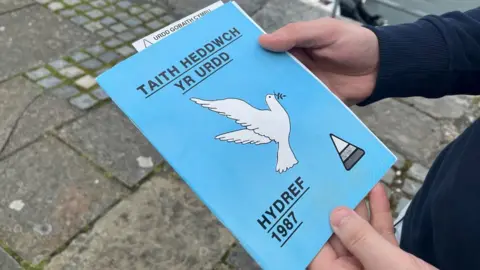 Guto Puw
Guto Puw"Diplomacy is the way forward and if people don't come around the table and discuss their differences, then there is no hope."
This year's message focuses on the climate emergency.
The Urdd said it was a "call to action by the children and young people of Wales to the young people of the world" hoping to urge governments and large corporations to "take urgent action to save our planet."
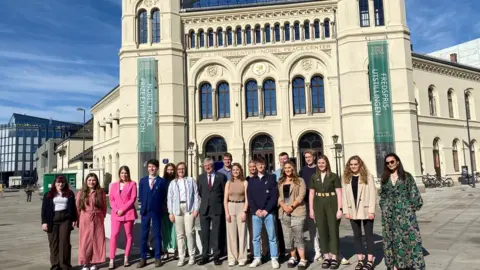
In the creation of this year's message, the Urdd worked with Aberystwyth University and a group of its students.
A formal partnership was created between their students and students from the University of Life Sciences in Norway.
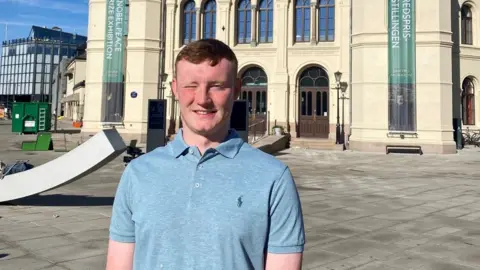
"Speaking to the students from the University of Life Sciences in Oslo meant we had more of an understanding of what young people afar from Wales wanted to be in the message is as well," said Dewi Richards, a student at Aberystwyth University.
"It's a great honour being part of the message on as big of an occasion as this - the importance of the message is massive."
The relationship was established to broaden understanding of climate change from different perspectives and cultures.
"It's been a big topic for years, so we thought this would be the year to get that message across - we have big expectations for it this year," said Hanna Eiddon Lewis who was among this year's writers.
The message has been shared online and a day of events is also being held in Oslo.
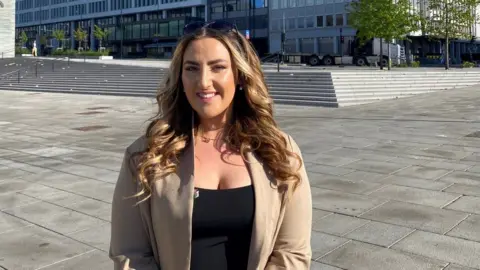

- BORN DEAF, RAISED HEARING: Jonny Cotsen explores what it means to live in two different worlds
- MARGINS TO MAINSTREAM: Michael Sheen introduces new writers revealing their truths

